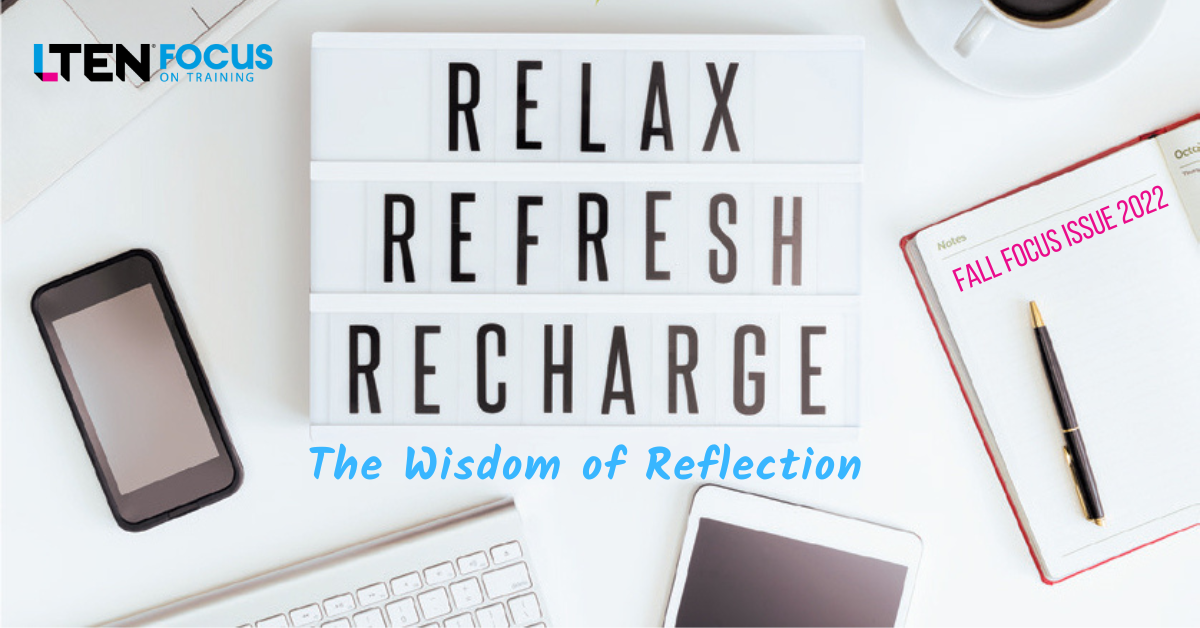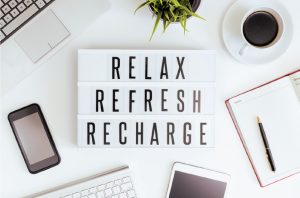
Taking the time to pause and reflect can keep stress under control
WORKING & LIVING WELL – Deborah Bonzell
 Amidst the bustle and noise of daily work-life, carving out time and space for contemplation — both on your own and with others — may be the smartest thing you do all day.
Amidst the bustle and noise of daily work-life, carving out time and space for contemplation — both on your own and with others — may be the smartest thing you do all day.
Recently, I facilitated a virtual learning session for an intact team at a growing biotech company. According to the team’s leader, they were a caring and highly skilled group who took great pride in their company’s innovative genetic testing technology. They were also, in his words, “regularly working ourselves to a state of exhaustion.”
Team members agreed. From full days of back-to-back meetings to a ceaseless flow of emails, texts and Slack messages (which regularly continued late into the night), there was a general feeling of overwhelm combined with “fear of missing out.” It was clear to all of us: This team was on the path to burning out.
As our focus shifted to solutions, we broke into small groups for a two-part discussion. First, each person spent a few minutes thinking about what aspect of their work-life most exhausted them personally, and then took turns sharing their insights out loud. This experience of naming unhealthy stressors was, on its own, revelatory.
Next, they considered one thing that, over the next month, they could stop or start doing on their own during working hours to increase their enjoyment. It’s important to emphasize here that the challenge was to change a workbased habit, as opposed to doing something to increase enjoyment during so-called leisure time.
While several folks committed to blocking time for a short exercise session or taking a proper lunch break with a family member or friend, the majority spoke about the need for something else. In their words:
- “Let myself be unproductive”
- “Focus on the now”
- “Block time to disconnect”
- “Don’t force urgency”
- “Take mini-breaks to just think.”
When the breakout discussions moved on to the second question — what small well-being experiments can you try together? — a similar theme emerged:
- “Put a pin in it”
- “Revisit our strategy”
- “Conduct a retro-review to ask: What did we say we were going to do, and did we actually do it?”
In short, this team came up with solutions to satisfy their individual and collective need for reflection.
Our Addiction to Action
On some level, I’m guessing this team’s story resonates with your own experience as a working professional. Why? Because although our ability to reflect is a fundamental human trait, many of us have been “overdoing” — both at work and at home — for a while now. Consider these statistics from the past five years:
- As of 2018, the average American was spending more than 51% of their time answering irrelevant emails (23%), attending unproductive meetings (16%) and commuting (13%), according to research published on Inc.com.
- A similar survey of senior managers shared in Harvard Business Review indicated that 64% of respondents felt that attending meetings got in the way of deep thinking.
- Time spent “thinking and reflecting” has largely been replaced by time spent on screens — the daily average spiked from 13 to 15 hours/day during the pandemic according to the most recent American Time-Use Study.
These numbers shed light on an ironic truth: We are alive during a period of history that has been dubbed The Information Age — in which more than 1 billion people worldwide are classified as “knowledge workers” — and yet many of us don’t seem to be spending much time “thinking about our thinking.”
This omission is costing us dearly, in terms of our health, happiness and productivity. But as a seasoned life sciences trainer, you also know this: We humans can fundamentally change our habits when we’re sufficiently motivated.
Building a Bridge to Learning
When we reflect, by definition, we “give careful thought to our beliefs, behavior and past experiences.” Reflection is rooted in the process of inquiry and involves looking at a situation from different perspectives. This form of contemplation allows us to construct a mental bridge between having an experience and learning from it. That’s quite an important outcome for trainers and educators like us.
Establishing a regular reflection practice can take many forms. For some, waking up early to think, pray, meditate or write in a journal works well. For others, taking a solitary evening walk or doing a mental review of the day just before bed is effective.
But consider this: You are a knowledge worker. This means that your job is to synthesize ideas and information. In other words: You get paid to think. Therefore, prioritizing reflection time during your workday is not an act of laziness or rebellion — it’s what you’re supposed to be doing.
Here’s a simple four-step reflection practice that I follow myself, and that my team and I share with participants in our well-being workouts:
- First, take three slow, smooth, deep breaths to relax your body and mind. You may also find it useful to visualize a clear sky or vast body of water to invite a quality of openness.
- Next, choose a question as the focus of your contemplation. We use a set of reflection prompts that can be remembered by the acronym PAUSE:
• Purpose: What matters most to me?
• Attitudes: What experiences have most shaped me?
• Understanding: What do I know and not know about a person or issue?
• Strengths: What activities give me energy or are effortless?
• Emotions: What words best describe how I feel right now? - Now, allow your thoughts to arise like floating clouds or ocean waves. As they come, observe them silently, say them out loud or write them down. Give yourself permission to sit with the question and resist the natural urge to quickly land on the ‘right answer.’ Remember: This is a mental practice, not a game show!
- Finally, consider how you might apply your insights going forward. What would you tell another person about what you’ve gained from ‘thinking about your thinking?’
Like all healthy habits, there’s no one-size-fits-all formula for a daily reflection practice; you’ll need to adapt it to fit your schedule, deliverables and mood. The key is to practice reflection both consciously and consistently to reap the benefits.
The Science of Reflection
Let’s start with a fun fact: Did you know that apes, whales and dolphins use self-reflection to learn and change their behavior? We can draw inspiration from these wise sentient beings.
For us humans, the list of benefits that can be felt from even a few minutes of regular reflection is long and includes:
- Improved self-awareness and selfregulation — two key components of emotional intelligence.
- Enhanced perspective and the ability to respond, not react — both of which have been shown to enhance decision-making.
- Improved confidence — which can lead to greater levels of motivation and goal achievement.
In the realm of workplace studies, researchers from Harvard Business School demonstrated that call center employees who spent time at the end of each workday reflecting about lessons learned performed 23% better after just 10 days than those who did not reflect.
Another Harvard study of working adults found a similar result — employees who were prompted to use their passive commute time to think about and plan for their day were happier, more productive and less burned out than people who didn’t.
Finally, some neuroscience. Through fMRI scans, we have learned that the act of self-reflection activates the Default Mode Network, an area of our brain that is involved in nearly all significant cognitive and emotional activities, including:
- Creativity, intelligence and language ability.
- Moral and emotional judgment.
- Empathy and overall mental wellbeing.
At the risk of sounding glib, this seems like a pretty darn good ROI for a few minutes of proverbial navelgazing, doesn’t it?
Food for Thought
Like other healthy rituals that support employee well-being, adopting a daily reflection practice is a choice that requires both intention and attention. Our fastpaced, distraction-filled and tech-enabled modern lifestyle has created barriers to regular contemplation that I believe can — and must — be overcome if we are to continue to learn and evolve as individuals, organizations and a global society.
My sincere hope is that the few minutes you’ve just invested in reading this article will inspire you to spend a few more in contemplation mode, either on your own or in the company of others. Because as the great philosopher Socrates once said, “An unexamined life is not worth living.”
Deborah Bonzell is a former life sciences trainer and the founder of The Well Workout. Email Deb at deb@thewellworkout.com.








